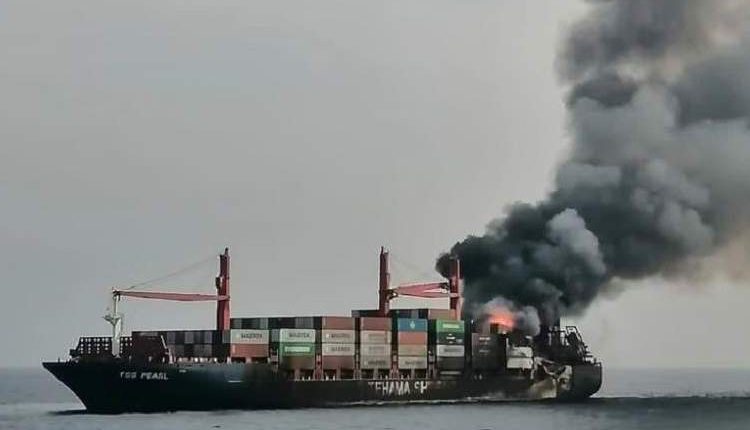Transport Minister Calls on UN to Launch Investigation of Ship Sinking off Saudi Port during Detention
The Minister of Transport, Abdulwahab Al-Durra, called on the United Nations to intervene and start an investigation to reach the causes of the burning and sinking of the ship off the port of Jizan and the inhumane behavior of the Saudi authorities.
In a call with Almasirah channel, the minister said that the fire was burning for nine days until it sank, without any response from the Saudi authority in Jizan port.
He pointed out that the shipping company said that the accident started with a fire in the engines, then moved to the cockpit, and the Saudi maritime authorities were called, but they did not respond.
He pointed out that the crew on the ship confirmed during their appeal to the Saudi Navy that they would bear the costs of extinguishing the fire, but they did not get a response.
The Minister of Transport said, “Compensation will be made through the shipping company and insurance companies, and we hope that the outstanding problems will be resolved.”
He added, “Two years ago, we asked the United Nations to return global shipping lines towards the ports of Hodeidah and Aden, but until today any ship that wants to reach Yemen stops at the ports of Jeddah and Jizan.”
On Monday, Minister of Transport, Abdulwahab Al-Durra, called on the United Nations to conduct an urgent and joint investigation into the issue of the burning and sinking of the container ship TSS pearl off the coast of Jizan in the Red Sea.
Minister Al-Durra was surprised by the United Nations’ disregard for the accident of the ship, which the US-Saudi aggression coalition refused to help and did what was necessary to save it while the fire was burning in it, which lasted nine days until it sank with the containers of food and medicine on it for the Yemeni people.
Saudi Arabia forces all ships entering Yemeni ports under the control of the coalition to go first to Jeddah or Djibouti port for inspection before allowing them to leave after long days in detention.
The Minister of Transport demanded that the ships of international shipping lines enter Yemeni ports directly without converting them to intermediate ships and lines, such as those that were exposed to fire and drowning, in order to prevent these accidents and the additional expenses that are reflected on goods and merchandise.
He confirmed the piracy on ships in light of international silence, considering this a violation of all laws, charters and international agreements, calling for pressure on the concerned authorities to quickly compensate the merchants affected by the sinking of the container ship and allow all ships to enter the port of Hodeidah in implementation of the Stockholm Agreement.
For his part, the head of the Secretariat’s Chamber of Commerce and Industry demanded to quickly compensate the owners of container goods that were carried by the container ship that sank off the coast of Jizan.
Container ship TSS PEARL on Oct 13 reported sank in Red sea after major fire. Many floating containers reported drifting in the area.
A UN-brokered truce lasted for six months in the seven-year-old war waged by Saudi Arabia and its regional allies supported by US and western countries against Yemen. However, in light of UN silence, the Saudi-led aggression was still obstructing flights to the Sana’a International Airport in Yemen’s capital and detaining fuel ships that were headed to the country.
The fires of the aggression side did not subside along the fronts, on the borders and inside, including shelling, reconnaissance, development and crawl.
When the period specified for the military and humanitarian truce was nearing its end, the US-Saudi aggression seemed to be in a hurry to adopt the option of extending it for the third time to freeze the battle in Yemen and its economic repercussions away from global energy markets.
The forces of aggression are pushing for an extension, not out of concern for peace, but rather out of fear that the escalation will add more complications to the international scene in addition to the crisis imposed by the Russian-Ukrainian war.

